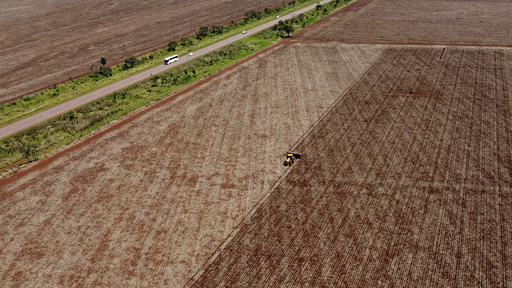AGUA CLARA, Brazil — A significant setback has occurred for the Soy Moratorium, an agreement that has played a vital role in reducing deforestation in Brazil’s Amazon for nearly 20 years. The recent enactment of a law in Mato Grosso, Brazil’s largest soybean-producing state, has put an end to the incentives for companies involved in the processing and trading of soybeans while participating in the moratorium.
The law, which was passed last week, aims to dismantle the Soy Moratorium, established in 2006 following a Greenpeace investigation. The investigation revealed a connection between soy produced in areas that experienced illegal deforestation and major American commodities corporations like Cargill, Bunge, and ADM. Under considerable pressure, these companies pledged to refrain from purchasing soy sourced from regions cleared after 2006, a deadline that was later adjusted to July 2008.
Research in recent years has indicated that the moratorium has contributed to the preservation of the Amazon rainforest. A 2020 study published in the journal Nature Food found that the combination of the moratorium and government policies led to the most significant reduction of deforestation recorded in the Brazilian Amazon between 2003 and 2016.
With the support of soybean growers and a majority of Mato Grosso’s lawmakers and mayors, the newly enacted legislation eliminates tax benefits for organizations that abide by any agreements limiting the expansion of agricultural activities into legally deforested areas. Signed by Governor Mauro Mendes on October 24, the law is set to come into effect on January 1, 2025, although specific regulations are still forthcoming.
The law stipulates that only areas of a property that have been illegally deforested will be barred from selling soy. For instance, if a 4,000-acre (1,618-hectare) farm clears 200 acres (81 hectares) unlawfully, only that particular portion’s yield will be restricted. Experts express concerns that such detailed monitoring could prove to be complex or even unmanageable.
Under the previous moratorium, any property that exhibited deforestation after 2008 was prohibited from selling its agricultural products, regardless of the legality of the land-clearing.
Proponents of the new law argue that the 2008 restriction of the moratorium is more severe than Brazilian regulations, which permit the deforestation of up to 20% of a large rural property within the Amazon. “We will advocate until the moratorium is abolished, as long as it negatively impacts even one producer,” stated Lucas Costa Beber, president of the Mato Grosso Soy Producers Association. He emphasized, “Until this agreement is eliminated, trading companies will remain restless.”
Environmental organizations and representatives from the soybean trade and processing sector have voiced their disapproval of Mato Grosso’s decision. “This law represents a regression,” remarked Bernardo Pires, sustainability director of the Brazilian Association of Vegetable Oil Industries (Abiove), a group that supports the moratorium. He suggested that companies committed to sustainable practices should be rewarded with even greater benefits rather than facing reductions.
Abiove members, which encompass Cargill, Bunge, and ADM, account for over 90% of soy production in Mato Grosso, with state tax benefits reaching approximately $308 million annually. Pires emphasized that the moratorium’s commitment to zero deforestation aligns with market demands, particularly from European consumers who avoid products linked to deforestation.
Cristiane Mazzetti, the coordinator for the forests campaign at Greenpeace Brazil, criticized the law, accusing politicians tied to agribusiness of adopting a double standard while attempting to push through legislation that weakens environmental protections in the Brazilian Congress.
The enactment of the new law has elicited mixed responses within President Luiz Inácio Lula da Silva’s administration, which has pledged to achieve zero deforestation by 2030. André Lima, secretary of deforestation control at the Ministry of the Environment and Climate Change, expressed concern that while state governments possess the authority to select which economic activities to support, it is unconstitutional to retract tax incentives from companies that comply with sustainability and climate standards that align with national deforestation reduction objectives.
Lima pointed out that such actions contradict the principles of national tax reform, which includes sustainable development as a key factor in the promotion of new tax incentives within the green economy. In contrast, Agriculture Minister Carlos Fávaro praised the new law, contending that the moratorium’s regulations are indeed stricter than current laws, which understandably frustrates producers.


